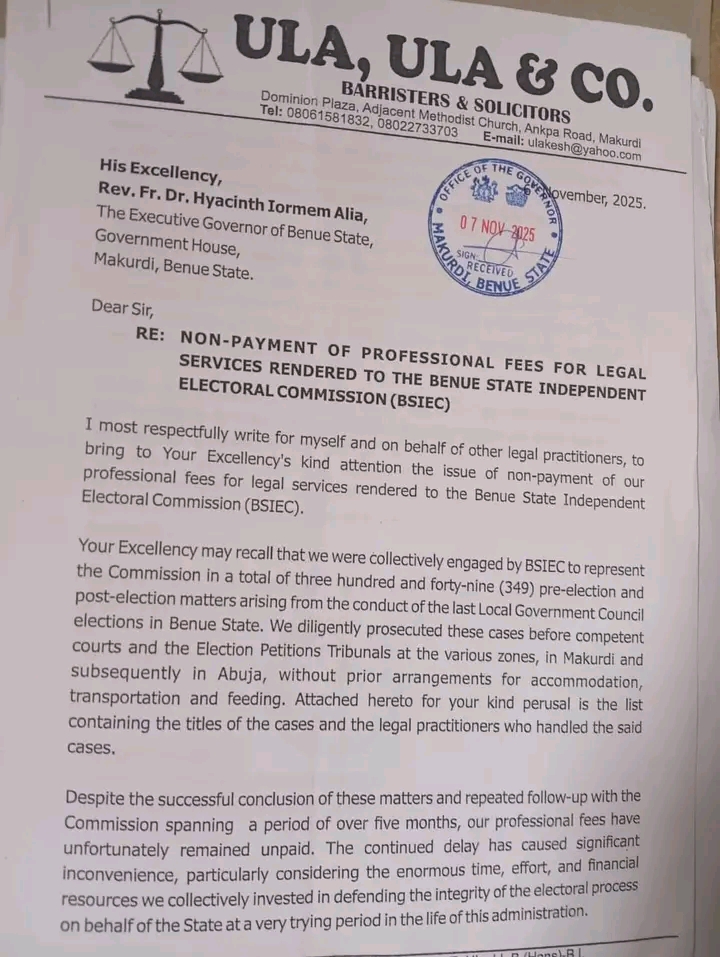Join our WhatsApp channel HERE for the latest Benue news and updates!
In a shocking twist of political intrigue in Benue State, Governor Hyacinth Alia is facing serious accusations of defrauding the very lawyers who defended his administration in high-stakes election petition cases. According to a viral Facebook post by user Ason D Jerry, the lawyers who represented the 23 Local Government Chairmen and 276 Councillors at the Election Petitions Tribunal and subsequent Appeal Tribunal have been left high and dry, despite the state government deducting massive sums from local government funds explicitly for their payment.
The cases in question stemmed from election disputes heard at the NBA House in Abuja. Judgments at the tribunal level were delivered in April 2025, with appeal rulings following on June 3, 2025. Over the six months the tribunal proceedings lasted, each of the 23 local governments reportedly had ₦30 million deducted monthly, totaling a staggering ₦4.14 billion. For the two months of appeal hearings in Abuja, an additional ₦100 million per local government was deducted, pushing the combined deductions to ₦2.3 billion for that phase alone. In total, more than ₦6.44 billion (precisely ₦6,440,000,000) was siphoned from local government accounts through the Bureau for Local Government and Chieftaincy Affairs—funds ostensibly earmarked to cover legal fees for these over 300 cases.
Yet, five months after the final appeals, the lawyers defending Governor Alia’s side claim they haven’t received a single kobo. The post highlights stark disparities in treatment: while lawyers representing the petitioners (from the “Stakeholders’ camp”) were lodged in five-star hotels in Abuja, provided with three square meals daily, and fully funded for accommodation, feeding, and transportation, Alia’s legal team was left to fend for themselves. Many reportedly trekked to the tribunal, slept in substandard and unhygienic conditions, and dipped into their own pockets to stay afloat during the proceedings.
The affected lawyers, in a moment of raw frustration overheard at the High Court premises, lamented their plight. They expressed visible anger, noting that after successfully securing wins for the government in all cases, they expected fair compensation. Instead, they’ve been ignored. One particularly galling detail: the government recently approved ₦2.55 billion (₦2,550,000,000), which was paid to a single Senior Advocate of Nigeria (SAN), Barr. Mohammed Ndarani, based in Abuja. Ndarani is accused of pocketing the entire sum without distributing a dime to the other lawyers involved.
The government also approved ₦5 million per case for the more than 300 decisions handed down by the tribunal—a figure that seems modest compared to the billions already deducted but raises questions about where the bulk of the funds vanished. The lawyers have reportedly chosen not to sue the government out of “love and respect” for Governor Alia, but they pose a pointed rhetorical question: Does the governor reciprocate that loyalty by denying them their hard-earned professional fees for over five months?
This scandal, if substantiated, paints a picture of gross mismanagement and potential corruption at the heart of the Alia administration. What happened to the over ₦6 billion deducted specifically to pay these lawyers? Who authorized the deductions, and where did the money go if not to the legal team that ensured the government’s victory? The post ends with a direct challenge: only Governor Alia can provide answers to these pressing questions.
As this story gains traction on social media, with the original post dated just two hours before widespread sharing, Benue residents and political watchers are demanding transparency. The Bureau for Local Government and Chieftaincy Affairs, which facilitated the deductions, owes the public an audit. In an era where local governments struggle with basic funding for development, diverting billions under the guise of legal expenses—only for it to allegedly disappear into private pockets—strikes at the core of governance trust.
Governor Alia’s office has yet to respond publicly to these allegations as of November 11, 2025. If true, this isn’t just a scam on dedicated professionals; it’s a betrayal of the local government system and the taxpayers footing the bill. The lawyers’ groans echo a broader sentiment: victory in court means little if justice is denied to those who fought for it. Watch this space for updates—Benue’s political drama is far from over.



















